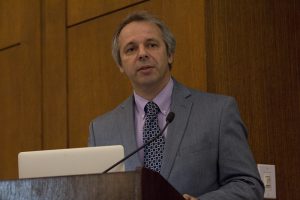![]() A new project led by researchers at RENCI and the UNC Eshelman School of Pharmacy aims to develop a biomedical data “translator” that will integrate, synthesize and interpret multiple sources of clinical and biomedical data to provide information to guide clinical care, inform clinical and translational research, stimulate drug discovery and repurpose and motivate public-health decisions.
A new project led by researchers at RENCI and the UNC Eshelman School of Pharmacy aims to develop a biomedical data “translator” that will integrate, synthesize and interpret multiple sources of clinical and biomedical data to provide information to guide clinical care, inform clinical and translational research, stimulate drug discovery and repurpose and motivate public-health decisions.
The project is funded by the National Institutes of Health’s National Center for Advancing Translational Sciences.
Data is ubiquitous in both clinical settings and in biomedical research labs. It includes disease symptoms noted by health-care professionals, lab results from tests done on patients, information about clinical procedures and the effects of specific drugs, evidence about the environmental and socio-environmental factors that affect diseases and disease treatments, the biological pathways and genetic underpinning of diseases and information about the chemical and molecular structure of drugs and drug targets.
The challenge is not about having enough data but about making sense of data and translating it to enable better clinical care, more productive research and more informed health-related decisions, said Alexander Tropsha, Ph.D., co-principal investigator of the Biomedical Data Translator Project and associate dean for pharmacoinformatics and data science and the K.H. Lee Distinguished Professor at the UNC Eshelman School of Pharmacy.
“If we want data to transform health-care and biomedical research, we need to develop best practices for managing, analyzing and using data, and we need the infrastructure to support those practices,” Tropsha said. “This project is a first step. We will develop the infrastructure, software and analytical solutions needed to create a working data translator for the biomedical sciences.”
As part of the effort, UNC researchers will develop four use cases, each targeting a specific type of user of biomedical data: a chronic-care provider, an acute care provider, a biomedical drug-discovery researcher and a public health policymaker. The use cases will focus on the environmental, socio-environmental and biological factors that influence asthma—a common disease associated with significant health problems and health-care costs. The use cases will delineate previously unrecognized asthma “endotypes” or distinct disease entities with different underlying pathophysiologies. David Peden, M.D., Ph.D., Harry S. Andrews Distinguished Professor of Pediatrics and director of the Center for Environmental Medicine, Asthma and Lung Biology at UNC, will oversee development of the use cases.
Stan Ahalt, Ph.D., director of RENCI and a professor in the UNC-Chapel Hill Department of Computer Science, serves as the lead PI on the UNC Biomedical Data Translator project. The project also involves researchers from RTI International and the NC TraCS Institute at the UNC School of Medicine. In addition to the grant to UNC-Chapel Hill and RTI, NCATS also funded four teams of faculty and staff from the Broad Institute of MIT and Harvard University; Columbia University; the Institute for Systems Biology in Seattle; the Jackson Laboratory in Bar Harbor, Maine; Johns Hopkins University; Lawrence Berkeley National Laboratory; the Mayo Clinic; Oregon Health and Science University; St. Jude Children’s Research Hospital; Stanford University; the University of California at San Diego; the University of Montreal; and the University of Utah.
“Translating data so it becomes actionable knowledge is one of the major challenges of our data-rich age,” Ahalt said. “As a result NCATS has assembled an unprecedentedly broad team of experts drawn from many fields and more than a dozen collaborating institutions. We think we have the brainpower and breadth of experience to make a real impact on biomedical research and patient care.”
The research teams also will conduct feasibility assessments to identify and define the infrastructure, software and analytical tools needed to support diverse data types and sources, extract knowledge from them and continuously incorporate new data and information from data. The assessments will identify barriers to data access, integration, and interpretation and develop plans to ensure data validity, quality, updates, security and privacy.
RENCI researchers and technical experts will work closely with others on the data translator team to complete the feasibility assessments and will provide a framework for the implementation and evaluation of use cases. RENCI will also analyze relevant data sources and requisite software and analytical tools.


